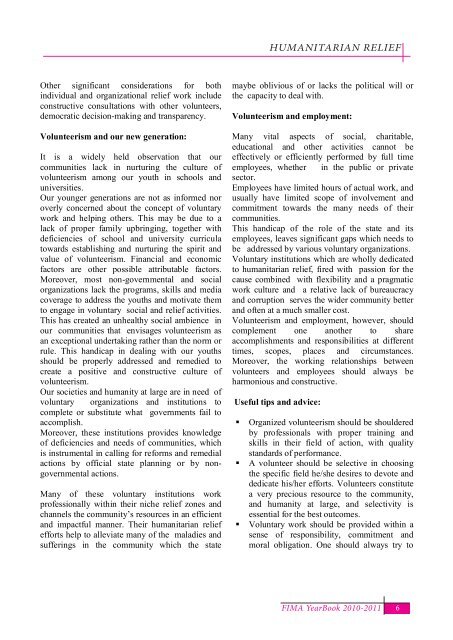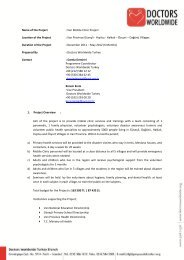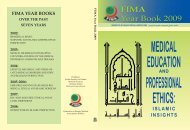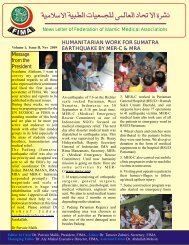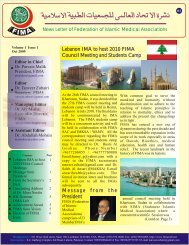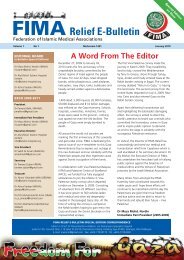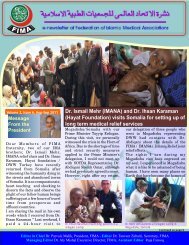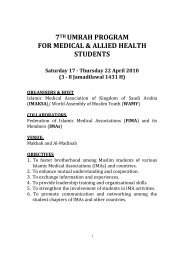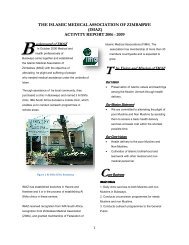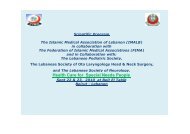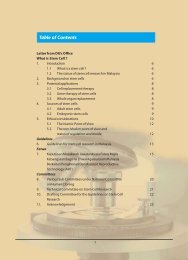FIMA Year Book 2010-2011 - Federation of Islamic Medical ...
FIMA Year Book 2010-2011 - Federation of Islamic Medical ...
FIMA Year Book 2010-2011 - Federation of Islamic Medical ...
You also want an ePaper? Increase the reach of your titles
YUMPU automatically turns print PDFs into web optimized ePapers that Google loves.
Humanitarian Relief<br />
Other significant considerations for both<br />
individual and organizational relief work include<br />
constructive consultations with other volunteers,<br />
democratic decision-making and transparency.<br />
Volunteerism and our new generation:<br />
It is a widely held observation that our<br />
communities lack in nurturing the culture <strong>of</strong><br />
volunteerism among our youth in schools and<br />
universities.<br />
Our younger generations are not as informed nor<br />
overly concerned about the concept <strong>of</strong> voluntary<br />
work and helping others. This may be due to a<br />
lack <strong>of</strong> proper family upbringing, together with<br />
deficiencies <strong>of</strong> school and university curricula<br />
towards establishing and nurturing the spirit and<br />
value <strong>of</strong> volunteerism. Financial and economic<br />
factors are other possible attributable factors.<br />
Moreover, most non-governmental and social<br />
organizations lack the programs, skills and media<br />
coverage to address the youths and motivate them<br />
to engage in voluntary social and relief activities.<br />
This has created an unhealthy social ambience in<br />
our communities that envisages volunteerism as<br />
an exceptional undertaking rather than the norm or<br />
rule. This handicap in dealing with our youths<br />
should be properly addressed and remedied to<br />
create a positive and constructive culture <strong>of</strong><br />
volunteerism.<br />
Our societies and humanity at large are in need <strong>of</strong><br />
voluntary organizations and institutions to<br />
complete or substitute what governments fail to<br />
accomplish.<br />
Moreover, these institutions provides knowledge<br />
<strong>of</strong> deficiencies and needs <strong>of</strong> communities, which<br />
is instrumental in calling for reforms and remedial<br />
actions by <strong>of</strong>ficial state planning or by nongovernmental<br />
actions.<br />
Many <strong>of</strong> these voluntary institutions work<br />
pr<strong>of</strong>essionally within their niche relief zones and<br />
channels the community’s resources in an efficient<br />
and impactful manner. Their humanitarian relief<br />
efforts help to alleviate many <strong>of</strong> the maladies and<br />
sufferings in the community which the state<br />
maybe oblivious <strong>of</strong> or lacks the political will or<br />
the capacity to deal with.<br />
Volunteerism and employment:<br />
Many vital aspects <strong>of</strong> social, charitable,<br />
educational and other activities cannot be<br />
effectively or efficiently performed by full time<br />
employees, whether in the public or private<br />
sector.<br />
Employees have limited hours <strong>of</strong> actual work, and<br />
usually have limited scope <strong>of</strong> involvement and<br />
commitment towards the many needs <strong>of</strong> their<br />
communities.<br />
This handicap <strong>of</strong> the role <strong>of</strong> the state and its<br />
employees, leaves significant gaps which needs to<br />
be addressed by various voluntary organizations.<br />
Voluntary institutions which are wholly dedicated<br />
to humanitarian relief, fired with passion for the<br />
cause combined with flexibility and a pragmatic<br />
work culture and a relative lack <strong>of</strong> bureaucracy<br />
and corruption serves the wider community better<br />
and <strong>of</strong>ten at a much smaller cost.<br />
Volunteerism and employment, however, should<br />
complement one another to share<br />
accomplishments and responsibilities at different<br />
times, scopes, places and circumstances.<br />
Moreover, the working relationships between<br />
volunteers and employees should always be<br />
harmonious and constructive.<br />
Useful tips and advice:<br />
• Organized volunteerism should be shouldered<br />
by pr<strong>of</strong>essionals with proper training and<br />
skills in their field <strong>of</strong> action, with quality<br />
standards <strong>of</strong> performance.<br />
• A volunteer should be selective in choosing<br />
the specific field he/she desires to devote and<br />
dedicate his/her efforts. Volunteers constitute<br />
a very precious resource to the community,<br />
and humanity at large, and selectivity is<br />
essential for the best outcomes.<br />
• Voluntary work should be provided within a<br />
sense <strong>of</strong> responsibility, commitment and<br />
moral obligation. One should always try to<br />
<strong>FIMA</strong> <strong>Year</strong><strong>Book</strong> <strong>2010</strong>-<strong>2011</strong> 6


